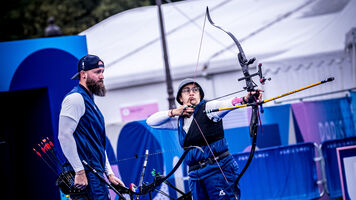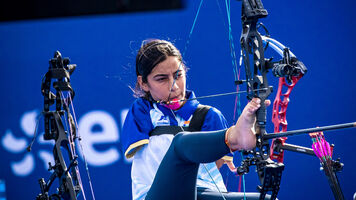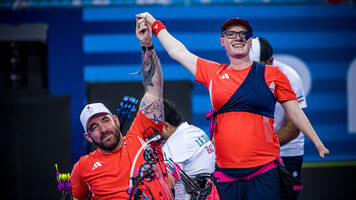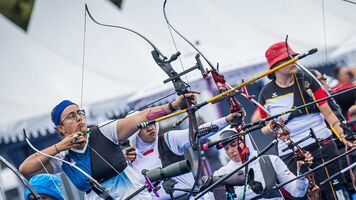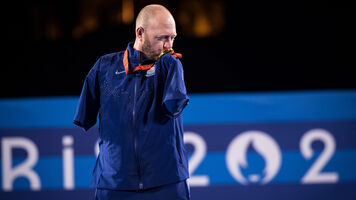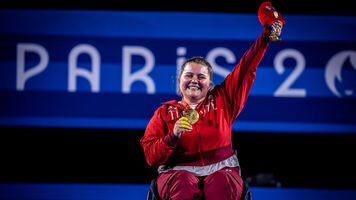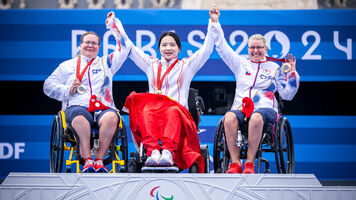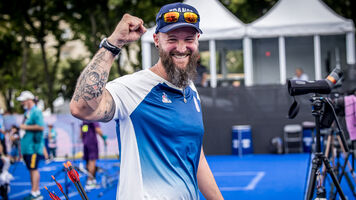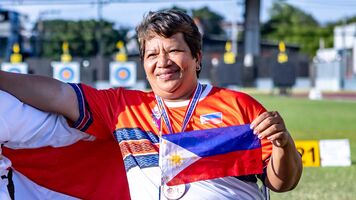Olympics: The curse of first

The ranking round is the critical element of Olympic archery in the modern era; it may not be the ultimate master of your fate, but a bad ranking round may doom you – and possibly, your team – to Olympic obscurity.
For the individual competition, it will decide who and when you meet those ranked higher than you, if you survive those first terrifying elimination rounds to make the business end of the finals.
One thing has remained consistent since the introduction of the ranking round in 1992: no man who has finished in first place in the ranking round has gone on to win the individual gold medal. Indeed, only one has even finished on the podium.
Let’s look at the results:
| COMPETITION | WINNER | TOP QUALIFIER |
| Tokyo 2020 Olympic Games | Mete Gazoz, Türkiye (qualified 10th) | Kim Je Deok (finished 17th) |
| Rio 2016 Olympic Games | Ku Bonchan, Korea (qualified 6th) | Kim Woojin (finished 17th) |
| London 2012 Olympic Games | Oh Jin Hyek, Korea (qualified 3rd) | Im Dong Hyun (finished 9th) |
| Beijing 2008 Olympic Games | Viktor Ruban, Ukraine (qualified 3rd) | Juan Rene Serrano (finished 4th) |
| Athens 2004 Olympic Games | Marco Galiazzo, Italy (qualified 3rd) | Im Dong Hyun (finished 5th) |
| Sydney 2000 Olympic Games | Simon Fairweather, Australia (qualified 8th) | Jang Yong-Ho, Korea (finished 9th) |
| Atlanta 1996 Olympic Games | Justin Huish, USA (qualified 9th) | Michele Frangilli, Italy (finished 5th) |
| Barcelona 1992 Olympic Games | Sébastien Flute, France (qualified 14th) | Chung Jae Hun, Korea (finished 2nd) |
At Seoul in 1988 the structure of the competition was different, with a 1440 round followed by a series of cumulative elimination rounds. Nevertheless, the same thing happened: the top qualifier in the opening round was the Soviet Union’s Vladimir Esheev, but the gold medal eventually went to Jay Barrs of the USA.
Of course it’s not really a curse – more a statistical trend – and it only takes one athlete to change things forever. But it’s clear that ranking first is a hefty chunk of of pressure on the shoulders of whoever is there.
And that pressure may be exactly the problem.
“There’s so many things that stack up to getting a performance right,” said Simon Fairweather, the Sydney 2000 Olympic Champion, who won that title from the 8th ranking position.
“Adding more focus from outside media with everybody scrutinising what you’re going to do now, it’s just more distraction, more pressure.”

It’s not the same ‘curse’ with the women’s competition, which has been dominated by Korean athletes since 1992.
An San in 2020, Ki Bo Bae in 2012, Park Sung-Hyun in 2004 and Cho Youn Jeong in 1992 have all topped the ranking round and gone on to win.
But that’s only four of the last eight winners, of course, and several Korean champions, such as Chang Hye Jin winning at the Rio 2016 Olympic Games (after qualifying in third) were not the Korean in top form going into the competition.
“People often say ignorance is the best medicine,” Chang said later about her win in Rio. “The pressure an athlete faces influences their performance in that competition. I was able to focus on the competition itself, rather than its outcome.”
“Until recently, the Korean women were so dominant, and so far ahead of the other women that they weren’t really put under the same pressure as they are now,” added Fairweather.
“They were always the best over a large number of arrows but when you get down to a match, and you get to normal fluctuations, it’s not a given. The playing field is more level.”

The major exception, and the most notorious challenge to Korean dominance of the women’s individual event, was Zhang Juan Juan of China, who qualified in a lowly 27th place at Beijing 2008 but went on to win, beating the defending champion Park Sung-Hyun in one of the biggest upsets in the history of Olympic archery.
Zhang won with the weakest ranking qualification place of any individual winner since 1992, men or women. But she may be the exception that proves the rule.
While a handful of archers claim not to ‘specialise’ in the 720 round and perform better in matchplay, statistical analysis has shown that performance in the ranking round correlates strongly with the chance of taking an individual medal in international recurve archery – and that’s the case for the women slightly more than the men.
One thing’s for sure: whoever’s on top of the ranking rounds will have some extra weight on their shoulders. And that pressure may not always be welcome.




